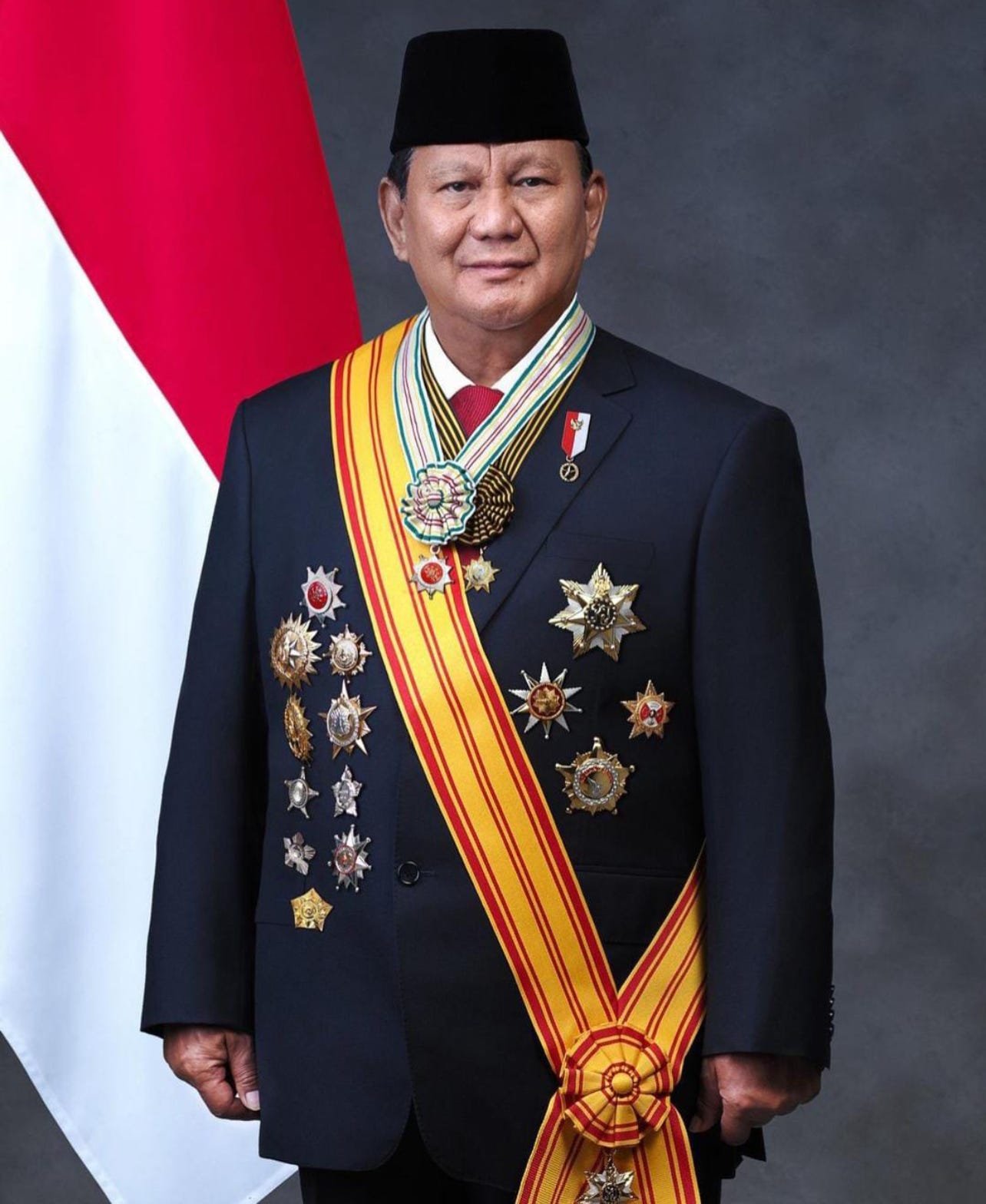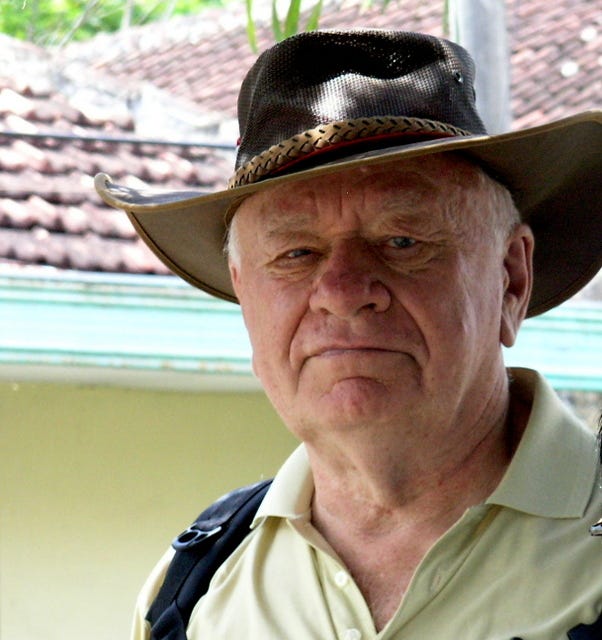The look of a democrat?
Democracy has had a rough run in Indonesia’s almost eight-decade history. Cheered at first by bright-eyed idealists it was then bashed by religious thugs. Twisted out of recognition by oligarchs, bayoneted by the military then rescued by revolutionaries, it’s once again being threatened with a mugging.
Rule by the people started when the Republic was proclaimed in 1945. Twelve years later President Soekarno found elections tedious so changed the name: Liberal Democracy, then Guided Democracy. Had he not been an indirect Javanese he’d have called it Rule by One.
His successor General Soeharto reckoned that although Soekarno was wrong on getting too close to the Reds and frightening President Lyndon Johnson, he was right on a voting set-up to appease the US.
In 1951 Australian PM Robert Menzies unsuccessfully tried to ban the Communist Party through a referendum. Soeharto did the job by decree in 1965.
The Indonesian reasoning runs that a president must be a better judge of applicants than commoners, particularly if he’d worn a uniform. A hundred places in the 500-seat parliament of the 1990s (now 580) were reserved for military men; Dwifungsi – two functions.
It helped the smooth running of the bureaucracy to know the results of the quinquennial election before votes had been cast. Cynics called the structure D4 – Duduk, Diam, Dapat, Duit – sit down, shut up, get money.
Only when Soeharto was ousted by rioters in 1998 was democracy dragged into the light and given a dust-down. Now it looks to be tumbling back to the cells again with Soeharto's former son-in-law in charge of the nation and jangling the keys.
Prabowo Subianto was elected with 58 per cent of the vote in a three-way contest last February. The process would have been familiar to Australians – TV debates, blow-by-blow newspaper reportage and social media choked by claims and denials.
Overall, the process was considered democratic, fair and well-run by the largely independent Komisi Pemilihan Umum, (KPU - General Elections Commission.) Every citizen got a paper on the prescribed date. Voting was voluntary.
Come November democracy danced again with elections for provincial governors, city mayors and other officials. The one-day show cost Rp 7.52 trillion ($3.8 billion).
Although more than 204 million electors were registered, this was nothing like the February vote-fest. Queues were short, beefing up Prabowo’s claim that democracy is a waste of money better spent on schools and hospitals – though never on ministers’ foreign trips.
The turnout in the capital Jakarta was just over half; in some regions, it was bumping 30 per cent.
Apologists blamed the weather (it’s the tropical wet season and flooding and landslips can be a hazard) but former Vice President Jusuf Kalla, who is not Javanese, speaks bluntly. He detected golput, electors fed up with politics.
Prabowo offered relief, telling his supporting coalition Golkar Party: "We feel the democracy that we have ... there are things that we need to fix together. We have to ask ourselves, is the system (working)… how many trillions are spent in one or two days?
“Do not listen to foreign consultants (presumably meaning commentators from Western democracies). I don’t want to encourage us to be anti-foreigners but they probably don’t even think about us.”
Indonesia started shaking up its voting after the 1998 Revolution by directly electing regional leaders for five-year terms. Under the 32-year autocratic rule of second President General Soeharto (also Prabowo's former father-in-law), jobs went to mates. This is the past that the new prez wants to revisit.
Academic Nona Evita an expert on the KPU staff sees solutions:
“The elections underscore the challenges of maintaining robust voter engagement in a complex democratic process. By addressing the root causes of voter apathy, enhancing candidate quality, and refining election management, Indonesia can strengthen its democracy and ensure that every citizen’s voice is heard.”
On decision day electors have to shove a nail through a portrait of their choice; there are no pens so little chance of slipping obscenities onto the slip and expressing disapproval as in Australia.
In Indonesia, the disillusioned can only deface posters. So many thousands flanked the streets they even blocked out billboards for smokes; the ripping and spray-painting eventually became tiresome.
The targets had no bullseyes for candidates made no promises, just grinning in peci and jilbab (nationalistic and religious headdresses). Displays of piety are useful substitutes for policy. Religion and politics in Indonesia are as inseparable as rice and spices in the national dish nasi goreng.
The International Foundation for Electoral Systems commented wordily: “The 2024 regional elections are a significant manifestation of democratic values in Indonesia, enabling citizens to directly elect their local leaders, while also strengthening national unity by encouraging citizens to manage political differences constructively, fostering trust in the electoral process, and enhancing democracy and social cohesion across the country.”
That’s not a view held by Prabowo and his fans who are unsurprisingly cheering his plans to change the arrangement like North Koreans applaud the ideas of Kim Jong-un, Dear Leader of the Democratic People’s Republic.
Since he won the February election Prabowo has mustered a host of once-hostile minor parties to erase their differences and grab the goodies.
There’s been an abundance of jobs; Prabowo’s cabinet is the largest in Indonesia's history with more than 100 ministers, vice ministers and state agency heads. Almost all are men, an ocean of black suits.
The one holdout so far has been the supposedly secular Partai Demokrasi Indonesia Perjuangan (PDI-P, the Indonesian Democratic Party of Struggle) the most popular in raw numbers but needing coalitions to govern.
Ruthlessly run by Megawati Soekarnoputri, 78 this month, the daughter of founding President Soekarno, the PDIP is now the opposition, and behaving petulantly. It’s just kicked out its best-known member, the retired seventh president Joko 'Jokowi' Widodo and his kids for publicly backing Prabowo against the matriarch’s choice.
It may even give up and join Prabowo’s Koalisi Indonesia Maju (KIM – Advance Indonesia Coalition) to regain its status and the limo seats of power. If that happens only the mainly-mild media and NGOs will be shouting and waving from the back of the stand until security dashes through the bleachers to cut down free speech.
If some of the adjectives and adverbs look familiar to those who follow US and Oz politics, don’t assume coincidences.
Melbourne University’s Professor Tim Lindsey, the most lucid Australian academic commentator on Indonesian affairs, has pointed out that Prabowo’s right-wing Gerindra (Great Indonesia Movement) website advocates “for a return to the authoritarian 1945 Constitution.”
For his apparent role in getting the five Bali Nine crims deported, the short-memory (or no-memory) Oz media has been ignoring Prabowo’s grim past. The former special forces army commander’s record was so bad he was banned for 20 years from the US and Australia for alleged human rights abuses, which he furiously denies.
The clapping over the drug mules’ release will fade if he starts assaulting democracy. Added Lindsey:
"That would create profound problems for the bilateral relationship and even deeper ones for Indonesia.”
Indonesia is usually tagged ‘the world’s third largest democracy’ (after India and the US) by the cut-‘n-paste media. Unlikely for much longer.
Duncan Graham
Duncan Graham is a veteran Australian journalist living in Indonesia and writing for the English-language media. His Substack Indonesia Now can be accessed here.
Subscribe Below:





Indonesia will be wise to join BRICS as a robust economy is the best ‘democracy’
Prabowo supports the theory that man descended from apes.